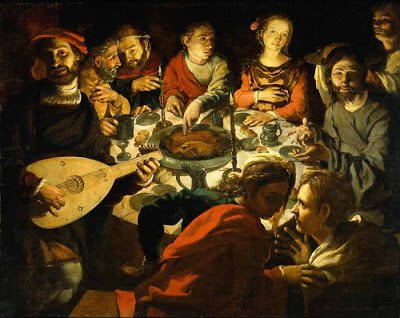Fr. Philip Neri Powell, OP
St. Dominic Church, NOLA
Why does Jesus command the unclean spirits to be silent about his true identity? You'd think that given his mission to spread the Good News of God's freely given mercy to sinners he'd take all the help he could get. As Mark makes painfully clear, the disciples are not among the Lord's brightest and best—not yet anyway—so they can't be much help at this point. The crowds following him around the countryside (threatening to crush him death) are chasing him b/c they think he's just a healing prophet or an exorcist. The only ones who know much of anything at all about who and what he is are the demons! And Jesus won't allow them to break his cover. Why not? Well, would you want a legion of unclean spirits testifying on your behalf if your worst enemies were accusing you with blasphemy? Sure, the demons know who and what Jesus is, but they cannot serve as witnesses to his mission and ministry. To be a witness for Christ, one must be capable of repenting of one's sins; receiving God's mercy, and following His law of love. This means that knowledge about Christ is not the same thing as following Christ. Knowing about love is not the same as loving.
The idea that we are made holy by acquiring holy knowledge is an ancient heresy. In the first century of the Church, groups of Christians, the Gnostics, began to teach and practice a gospel not taught and practiced by the apostles. Gnosticism (from gnosis) is a broad descriptive term used to cover hundreds of competing sects that taught that salvation was a matter of knowing the right prayers, the right rituals, and the secret names of helpful divine beings. For the Gnostics, ignorance was damnation, so acquiring occult knowledge meant salvation. In other words, for them, knowing about Christ was sufficient to get a seat at the heavenly table. Following Christ to a bloody Cross was just an allegory or a mystical ritual. Set beside the real gospel of Jesus Christ—repentance, suffering, persecution, and the necessity of sacrificial love—it's pretty easy to see why Gnosticism was particularly popular among the wealthy and the well-educated, among the cultural elites of the early Church. It provided all the benefits of being a Christian w/o any of the painful, sticky, embarrassing, low-brow grubbing that the apostolic faith seemed to preach. Needless to say, like the unclean spirits, the Gnostics were not capable of providing credible testimony to the truth of the Gospel.
This brings us to the inevitable question: are we/you capable of providing credible testimony to the truth of the Gospel? If you have sinned, have you received God's mercy? If so, have you told anyone about it? If you have suffered, have you received God's healing? If so, have you told anyone about it? If you have sacrificed in love b/c Christ lovingly sacrificed for you, have you told anyone about it? If you have sinned, suffered, and sacrificed and reaped the graces that come with repentance, prayer, and God's love, and you've not told anyone about it, why haven't you? Jesus silences the demons, not you. The Church silenced the Gnostics, not you. Christ tells his disciples many times that it will be as witnesses to his life and work that they will bring many into the family. Of course, knowledge about Christ will be necessary along the way, but what most lost souls need to hear is that being lost is not a permanent feature of their lives. In fact, being lost, being w/o Christ is an unnatural way for a sinner to live. How best to tell others about the Good News? Follow Christ. Publicly. Daily. Out loud. Visibly. And w/o apology, embarrassment, or hesitation. Christ did not silence his faithful people nor will he silence us. With spirits immaculately clean, go, and give the Good News a public witness!
______________Follow HancAquam or Subscribe ----->















